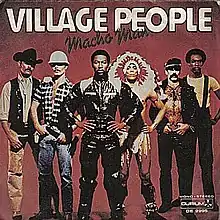Macho Man (album)
Macho Man is the second studio album[1][3][4] by Village People, released on February 27, 1978. The album gained success due to its hit singles, "Macho Man" (US Billboard pop chart No. 25) and "Key West". Rolling Stone said of the album, "It seems certain to become the first out-and-out disco album without John Travolta on its cover ever to be certified platinum".[4]
| Macho Man | ||||
|---|---|---|---|---|
 | ||||
| Studio album by | ||||
| Released | February 27, 1978 | |||
| Recorded | 1977 | |||
| Studio | Sigma Sound Studios, New York City | |||
| Genre | Disco | |||
| Length | 27:23 | |||
| Label | Casablanca | |||
| Producer | Jacques Morali | |||
| Village People chronology | ||||
| ||||
| Singles from Macho Man | ||||
| ||||
| Review scores | |
|---|---|
| Source | Rating |
| AllMusic | |
| Christgau's Record Guide | C[2] |
| Rolling Stone | Favorable[3] |
The album was reissued on CD in 1999.
Background
Village People began in 1977 as a studio project of French producers Jacques Morali, Henri Belolo and lead singer Victor Willis. Village People’s first album, Village People, was recorded by Willis with the help of studio musicians. After the success of that album, Morali and Belolo received numerous requests for live performances. In response, Morali and Belolo began to work on the formation of a full group of singers and dancers. They placed an ad in New York theatre trade magazines that read: "Macho Types Wanted: Must Dance and Have a Moustache".[5]
Randy Jones, known as the cowboy member of Village People, explains that "there was a dire need to have six capable performers to breathe life into the fantasies of the music and to sing, promote, and bring the concept of Village People to television and to the live performance onstage."[6] The new line-up of Willis, Jones, Glenn Hughes, Felipe Rose, David Hodo and Alex Briley made its debut on the cover of the already-recorded album Macho Man.[7]
Track listing
All tracks are written by Jacques Morali, Victor Willis, Henri Belolo and Peter Whitehead, except where noted
| No. | Title | Length |
|---|---|---|
| 1. | "Macho Man" | 5:14 |
| 2. | "I Am What I Am" | 5:38 |
| 3. | "Key West" | 5:46 |
| 4. | "Just a Gigolo" (Leonello Casucci, Irving Caesar) | 1:15 |
| 5. | "I Ain't Got Nobody" (Spencer Williams, Roger A. Graham) | 3:22 |
| 6. | "Sodom and Gomorrah" | 6:15 |
Charts
Weekly charts
| Chart (1978) | Peak position |
|---|---|
| Australian Albums (Kent Music Report)[8] | 5 |
| Canadian Albums (RPM)[9] | 21 |
| French Albums (SNEP)[10] | 6 |
| Swedish Albums (Sverigetopplistan)[11] | 37 |
| US Billboard 200[12] | 24 |
| US Top R&B/Hip-Hop Albums (Billboard)[12] | 31 |
| Zimbabwean Albums (ZIMA)[13] | 11 |
Year-end charts
| Chart (1978) | Position |
|---|---|
| Australian Albums (Kent Music Report)[14] | 14 |
Certifications and sales
| Region | Certification | Certified units/sales |
|---|---|---|
| Australia (ARIA)[15] | Gold | 35,000^ |
| Canada (Music Canada)[16] | 3× Platinum | 300,000^ |
| United States (RIAA)[17] | Platinum | 1,000,000^ |
| Summaries | ||
| Worldwide | — | 2,000,000[18] |
|
^ Shipments figures based on certification alone. | ||
References
- Hamilton, Andrew. "The Village People – Macho Man (AllMusic review)". AllMusic. All Media Network. Retrieved September 24, 2016.
- Christgau, Robert (1981). "Consumer Guide '70s: V". Christgau's Record Guide: Rock Albums of the Seventies. Ticknor & Fields. ISBN 089919026X. Retrieved March 19, 2019 – via robertchristgau.com.
- Schneider, Mitchell. "The Village People – Macho Man (Rolling Stone review)". Rolling Stone. Archived from the original on October 2, 2007. Retrieved September 24, 2016.
- Androite, John-Manuel (2001). Hot Stuff: A Brief History of Disco. Harper Entertainment. p. 88.
- Midgley, Alex (2014). ""'Macho Types Wanted': The Village People, Homophobia, And Representation In The 1970s"". Australasian Journal of American Studies. 33: 106–7.
- Jones, Randy; Bego, Mark (2008). Macho Man: The Disco Era and Gay America's "Coming Out". Westport, CT: Praeger. p. 83.
- Midgley, Alex (2014). "'Macho Types Wanted': The Village People, Homophobia, And Representation In The 1970s". Australasian Journal of American Studies. 33: 107.
- Kent, David (1993). Australian Chart Book 1970–1992 (illustrated ed.). St Ives, N.S.W.: Australian Chart Book. p. 330. ISBN 0-646-11917-6.
- "Top Albums/CDs - Volume 29, No. 26, September 23 1978". Collectionscanada.gc.ca. Archived from the original on September 24, 2016. Retrieved September 24, 2016.
- "Tous les Albums de l'Artiste choisi". InfoDisc. Retrieved April 6, 2017.
- "Swedishcharts.com – Village People – Village People". Hung Medien. Retrieved September 3, 2016.
- "The Village People – Awards". AllMusic. All Media Network. Archived from the original on October 5, 2012. Retrieved September 24, 2016.
-
- Zimbabwe. Kimberley, C. Zimbabwe: albums chart book. Harare: C. Kimberley, 2000
- Kent, David (1993). Australian Chart Book 1970–1992 (illustrated ed.). St Ives, N.S.W.: Australian Chart Book. p. 430. ISBN 0-646-11917-6.
- "Morali Wins Aussie Awards" (PDF). Cash Box. Vol. 40, no. 36. January 20, 1979. p. 30. Retrieved September 8, 2020 – via World Radio History.
- "Canadian album certifications – Village People – Macho Man". Music Canada.
- "American album certifications – Village People – Macho Man". Recording Industry Association of America.
- Murrells, Joseph. Million selling records from the 1900s to the 1980s : an illustrated directory. Arco Pub. p. 467. ISBN 0668064595.
By mid-1979, this album had soldtwo million